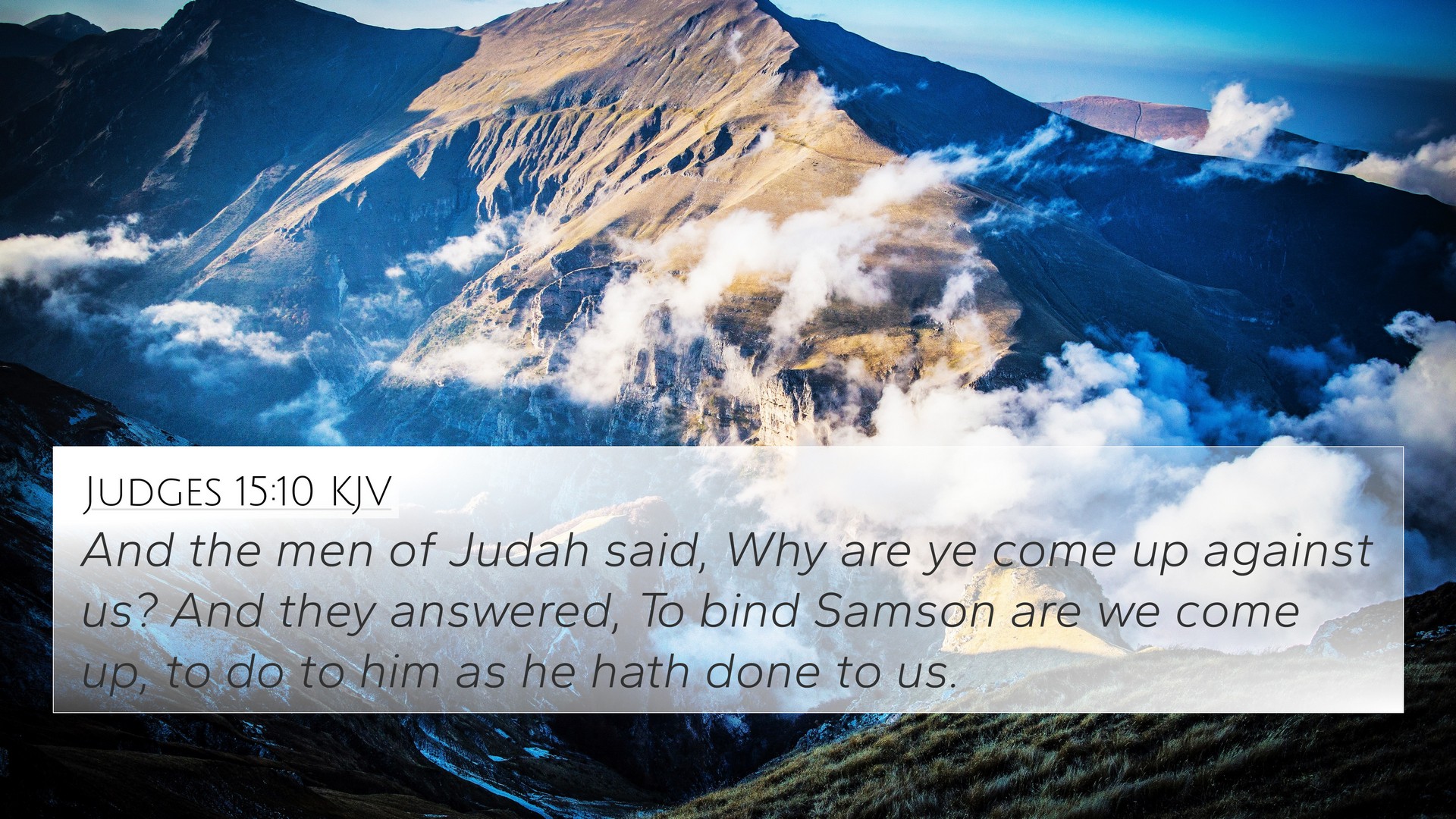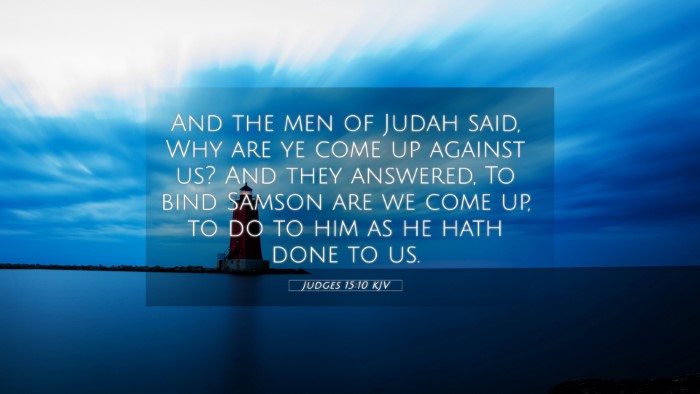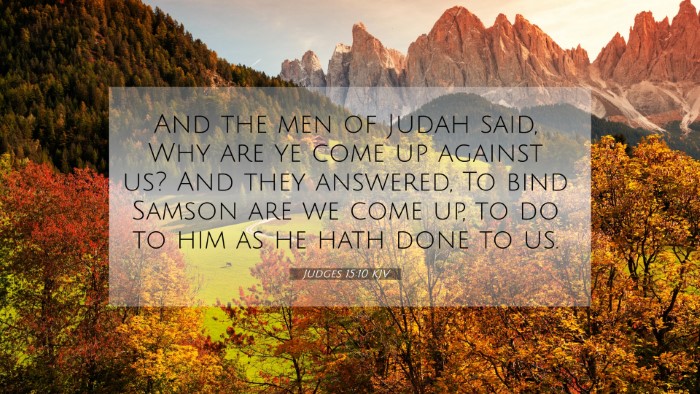Old Testament
Genesis Exodus Leviticus Numbers Deuteronomy Joshua Judges Ruth 1 Samuel 2 Samuel 1 Kings 2 Kings 1 Chronicles 2 Chronicles Ezra Nehemiah Esther Job Psalms Proverbs Ecclesiastes Song of Solomon Isaiah Jeremiah Lamentations Ezekiel Daniel Hosea Joel Amos Obadiah Jonah Micah Nahum Habakkuk Zephaniah Haggai Zechariah MalachiJudges 15:10 Similar Verses
Judges 15:10 Cross References
And the men of Judah said, Why are ye come up against us? And they answered, To bind Samson are we come up, to do to him as he hath done to us.
Uncover the Rich Themes and Topics of This Bible Verse
Listed below are the Bible themes associated with Judges 15:10. We invite you to explore each theme to gain deeper insights into the Scriptures.
Judges 15:10 Cross Reference Verses
No cross reference images were found in our system for this Bible passage.
Judges 15:10 Verse Analysis and Similar Verses
Understanding Judges 15:10
Judges 15:10: "And the men of Judah said, Why are ye come up against us? And they answered, To bind Samson are we come up, to do to him as he hath done to us."
Overview of the Context
This verse is situated in the narrative of Samson, the last judge of Israel, who was endowed with immense strength. At this juncture, the Philistines, Israel's oppressors, are keen to capture Samson, who had retaliated against them in previous encounters. This highlights a cycle of vengeance and conflict that permeates the Book of Judges.
Meanings and Interpretations
The combined insights from public domain commentaries offer a rich understanding:
- Matthew Henry: He reflects on the cyclical nature of vengeance and betrayal prevalent throughout the Book of Judges. The men of Judah’s question reflects their confusion and perhaps fear regarding Samson's actions and the Philistines' motives. Henry emphasizes how the internal conflicts among the Israelites weaken them against their enemies.
- Albert Barnes: Barnes draws attention to the precarious position of the tribe of Judah, signifying their struggle. He notes their lack of understanding regarding God’s plans for Samson, who was to be a deliverer. This misunderstanding is essential in examining the complex dynamics of leadership and obedience in Israel during this time.
- Adam Clarke: Clarke’s commentary elucidates the concept of divine purpose mixed with human folly. He points out that while Samson acts out of personal grievance, there is a deeper divine narrative at play, as God uses Samson’s actions for the liberation of Israel from Philistine oppression. Clarke emphasizes the moral implications of each man’s actions.
Cross-References and Thematic Connections
This verse connects with several other Scriptures, enhancing understanding through scriptural cross-referencing. Notable associated verses include:
- Judges 14:4: "But his parents knew not that it was of the LORD, that he sought an occasion against the Philistines: for at that time the Philistines had dominion over Israel." - Highlights God’s orchestration amidst human actions.
- Judges 16:20: "And she said, The Philistines be upon thee, Samson. And he awoke out of his sleep, and said, I will go out as at other times before, and shake myself. And he wist not that the LORD was departed from him." - Presents Samson’s tragic downfall due to complacency.
- 1 Samuel 10:22: "Therefore they enquired of the LORD further, if the man should yet come thither. And the LORD answered, Behold, he hath hid himself among the stuff." - Illustrates the theme of divine election and hidden intentions.
- Romans 11:33: "O the depth of the riches both of the wisdom and knowledge of God! how unsearchable are his judgments, and his ways past finding out!" - Reflects on the inscrutable nature of God’s plans.
- Galatians 6:7: "Be not deceived; God is not mocked: for whatsoever a man soweth, that shall he also reap." - Timely warning regarding human actions and their consequences.
- Matthew 5:9: "Blessed are the peacemakers: for they shall be called the children of God." - Contrasts with the vengeful nature depicted in Judges.
- Hebrews 11:32-34: "And what shall I more say? for the time would fail me to tell of Gideon, and of Barak, and of Samson, and of Jephthae; of David also, and Samuel, and of the prophets." - Acknowledges Samson's role alongside other heroes of faith.
Thematic Analysis
Exploring thematic Bible verse connections, it can be observed that the narrative of Samson encompasses themes of:
- Divine Sovereignty: God’s hand guides the events even amidst chaos.
- Betrayal and Misunderstanding: The Israelites’ failure to comprehend Samson's role reflects broader societal issues.
- The Cycle of Sin: The inhabitants of Israel continuously fall into cycles of disobedience and deliverance.
- Vengeance vs. Justice: The concept of revenge pervades this passage, leading to questions of what true justice means.
Applying Cross-Referencing Tools
The understanding of Judges 15:10 is enriched through careful application of Bible cross-reference guides. To effectively interpret biblical passages, consider:
- Utilizing a Bible concordance to identify key terms and themes.
- Employing a cross-reference Bible study system to seek parallel passages.
- Engaging in cross-referencing Bible study methods to examine implications in both Old and New Testaments.
Conclusion
Judges 15:10 serves not only as a crucial moment in Samson's narrative but as a touchstone for deeper discussions on themes of vengeance, divine purpose, and human failure in the biblical text. By utilizing tools for scripture analysis, one can appreciate the rich tapestry woven throughout the Bible, identifying connections and gaining a deeper understanding of God's overarching narrative.


